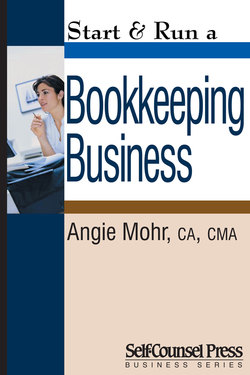Читать книгу Start & Run a Bookkeeping Business - Angie Mohr - Страница 29
На сайте Литреса книга снята с продажи.
Insurance
ОглавлениеInsurance tends to be one of those things you don’t give much thought to on a regular basis. It’s important, however, to ensure that your personal assets are adequately protected — including yourself! There are four main types of insurance to consider to cover your personal assets.
• Life insurance. Once you own a small business, you should reevaluate the amount and type of life insurance you carry. You will need to make sure your spouse, children, and other dependents will have enough to pay off the debts and live on comfortably if your source of income dries up. Keep in mind immediate expenses upon your death such as funeral costs. Also keep in mind future expenses you had been planning to fund, such as your children’s university educations and weddings.
• Mortgage insurance. The purpose of mortgage insurance is to pay off your mortgage balance if you die (and sometimes when you become disabled). Most mortgage insurance policies have inherent problems, however, and you should speak to your accountant or financial adviser before entering into such a policy. The premiums on most mortgage insurance policies are set based on the amount owing when the policy is first set up. So, for example, you may owe $150,000 now on your mortgage and will pay premiums based on that. In ten years, when you die, you may owe only $10,000, and that would be the amount paid out on the policy. In general, the premiums for mortgage insurance tend to be high compared to the payout. Mortgage insurance can be replaced with additional life insurance for a much lower cost in many cases.
• Property and casualty insurance. This is the insurance you get on your “stuff” — home, vehicle, and other assets. Some policies also have a liability clause that protects visitors from harm that has occurred on your property. The minimum amount of insurance you will want (and that will most likely be required by lenders) is what it takes to cover the debt that is secured by the assets. So, for example, if you have a car that you purchased for $10,000, and you still owe $4,500 on it, you will want at least $4,500 in insurance, otherwise you will end up owing money to the financing company if you total the car.
• Health insurance. The majority of people are underinsured in the area of health insurance. It is tempting to assume you will be healthy until you retire, but this is dangerous thinking. If your health fails, your ability to earn income may disappear, along with your plans for retirement. As a small-business owner, health insurance is essential, for you will not be able to rely on any employer- or government-funded health plans.
You need to consider two major areas of health insurance coverage. The first is that you will not have your income any longer. As a small-business owner, you will have to hire someone to do the work you once did or you may even have to close the doors of your business. Either way, you will have to replace your former income.
The second is that you may have ongoing medical and long-term care expenses in the future. For example, you may have to hire a private care nurse to attend to your medical needs.
There are many forms of health insurance. Some include coverage for drugs and dental expenses, some pay out a lump sum when you are diagnosed with a critical illness, and some provide ongoing payments for your lifetime. Discuss coverage with your financial adviser or insurance specialist to make sure you will be able to continue to meet your personal and business financial goals in the event of serious illness.
